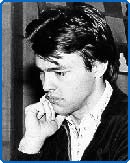(111) Three experiments that could change the world: a) Nice D(h)arshans, b) Pets´ powers and c) The only constant
a) On May 10th 1995 I thought back to an incident from the mid 1980s where a chess master complained to Dharshan Kumaran about his behaviour during a game they had just played.
The master was notoriously paranoid, and his objections were ludicrous, for Kumaran was a most courteous young man who went on to study at Oxford, qualify as a medical Doctor and also achieve the Grandmaster title.
I thought on how, a few years later, I had relayed this incident to another player and, in order to illustrate the paranoia had just said "Dharshan!".
The name alone had been sufficient to make the point.
About seven hours later I was reading from Rupert Sheldrake's book Seven Experiments that Could Change The World.
http://www.sheldrake.org/experiments/seven_experiments.html
I reached page 106 where he discusses the popularly held belief that people can sense when they are being stared at.
It reads -
"The positive effects of looks, especially loving looks, are also widely acknowledged. In India, for instance, many people visit holy men and women for their Darshan, literally their look, which is believed to confer great blessings."
The master was notoriously paranoid, and his objections were ludicrous, for Kumaran was a most courteous young man who went on to study at Oxford, qualify as a medical Doctor and also achieve the Grandmaster title.
I thought on how, a few years later, I had relayed this incident to another player and, in order to illustrate the paranoia had just said "Dharshan!".
The name alone had been sufficient to make the point.
About seven hours later I was reading from Rupert Sheldrake's book Seven Experiments that Could Change The World.
http://www.sheldrake.org/experiments/seven_experiments.html
I reached page 106 where he discusses the popularly held belief that people can sense when they are being stared at.
It reads -
"The positive effects of looks, especially loving looks, are also widely acknowledged. In India, for instance, many people visit holy men and women for their Darshan, literally their look, which is believed to confer great blessings."
b) Around 2 p.m. one afternoon in early May 1995 I was reading from the chapter in that Sheldrake's book where he discusses the ability which some pets seem to have of knowing when their owners are going to return.
I then walked into another room where a film was showing on TV in which a woman remarked that her dogs always seemed to know when she was returning.
I then walked into another room where a film was showing on TV in which a woman remarked that her dogs always seemed to know when she was returning.
c) At 10:10 p.m. on May 13th 1995 I had reached Chapter 6 of Sheldrake's book which is entitled The Variability of the Fundamental Constants.
Here he argues that fundamental constants in physics such as Planck's constant or the speed of light may in fact be variable. (There was such disagreement upon the precise definition of the speed of light that it had to be officially defined by a committee in 1972.)
In the background on the TV, a film called Star Trek IV was just ending. Mr Sulu made the closing remark -
"In a theocratic universe there is only one constant."
Here he argues that fundamental constants in physics such as Planck's constant or the speed of light may in fact be variable. (There was such disagreement upon the precise definition of the speed of light that it had to be officially defined by a committee in 1972.)
In the background on the TV, a film called Star Trek IV was just ending. Mr Sulu made the closing remark -
"In a theocratic universe there is only one constant."



Comments